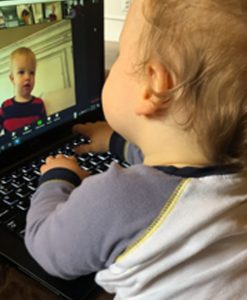
TUSCALOOSA, Ala. – While preschool children from The University of Alabama Children’s Program and RISE Center are home, they continue to connect with teachers, learn, play and receive therapy through inventive and individualized online interactions.
Staff decided from the outset of the COVID-19 pandemic to focus on maintaining relationships with children and supporting parents, said Michelle Darabaris, director of the Children’s Program.
“We understand that children learn best through play and exploration, so what they need most, in the best and worst of times, are consistent relationships and numerous opportunities for play,” said Darabaris. “We planned to send videos of our teachers modeling creative learning experiences for parents to share with children.”
Early childhood education research shows children birth to 5 years learn best through play, said RISE Director Andi Gillen.
“As the days and weeks ahead unfold, we hope parents will consider their home environment and the endless opportunities for play,” said Gillen. “We are here with resources for our families and, together, will rise at home to continue to help children grow.”
Since time is a precious commodity as some parents struggle to work from home while caring for the children, Children’s Program videos are saved on protected classroom Facebook pages for parents to access.
RISE parents can go to the password-protected part of the RISE website for teacher’s classroom blogs and physical, occupational, music, speech and language therapy videos and instruction sheets. RISE is also providing therapy sessions to families targeting children’s individual therapy goals through videoconferencing and phone calls.
To create engaging content for preschoolers, some teachers have donned chef hats to share cooking and texture exploration demonstrations. Others have collected items during walks around their own backyards to spark curiosity, encouraged artistic creativity using sidewalk chalk or everyday art materials at home.
Teachers from both programs recorded themselves reading their favorite books and singing familiar songs because reading and storytelling are important parts the school day.
In addition, teachers consulted with parents about schedules, routines and dealing with strong emotions their children experience. Teachers arranged virtual meetings so preschoolers can see, hear and support their best friends. Children’s Program students can also check in with class pets that relocated to teachers’ homes.
“While this isn’t anything we would’ve wished for, we’ve discovered a deeper, more authentic connection with families,” said Darabaris. “We’ve seen each other at our best and worst, with pets and children running through Zoom meetings, figuring out technology and in our most vulnerable states.
“We believe that relationships are the foundation for our success and while we can’t physically be there to care for their children, we want families to know we will continue to support, equip and cheer them on until we’re together again.”
Contact
Tabby Brown, UA College of Human Environmental Sciences, tbrown@ches.ua.edu
